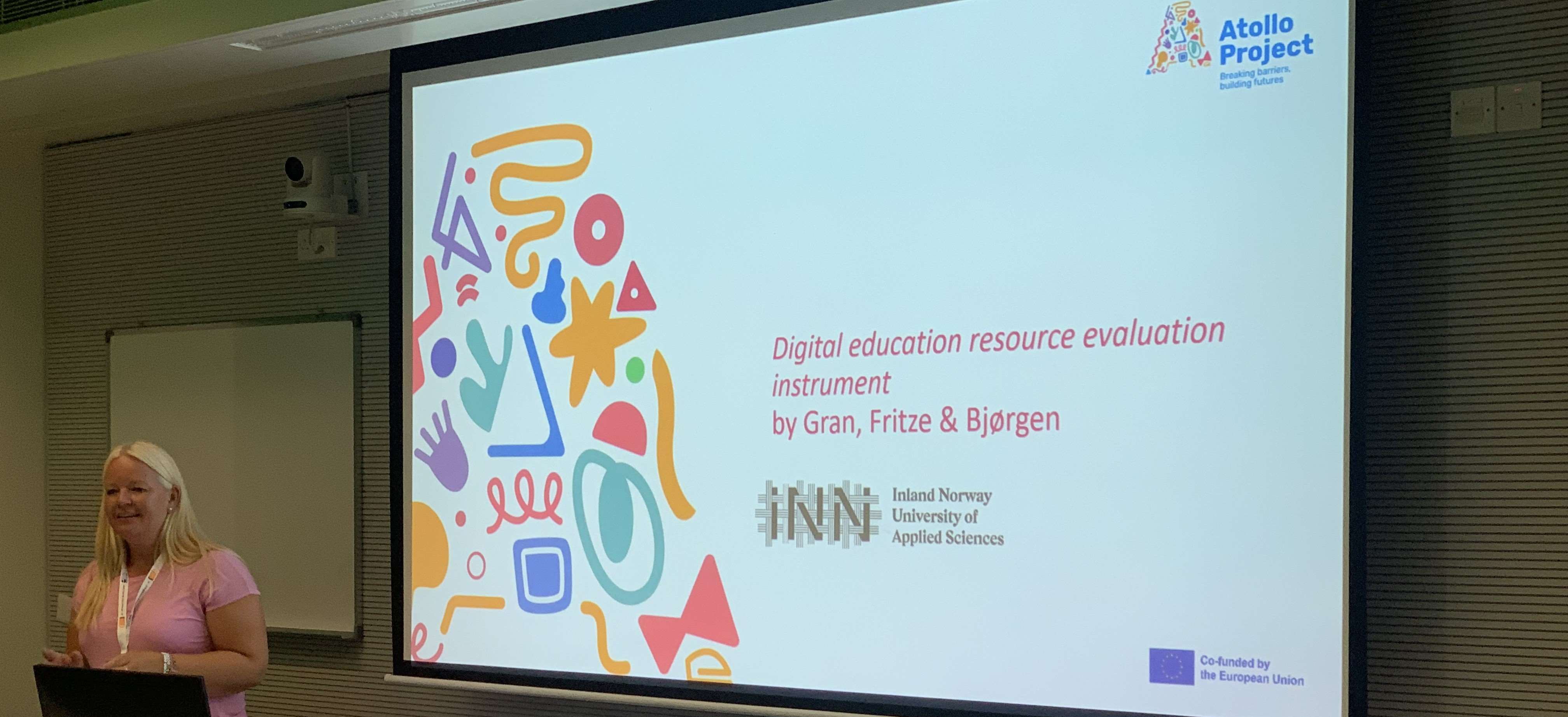Atollo Project Partner, Lillian Gran, Presents at ECER 2024 in Nicosi
At the recent European Conference on Educational Research (ECER) 2024 in Nicosia, Cyprus, Lillian Gran, an Associate Professor at the Department of Education at Inland Norway University of Applied Sciences (INN), represented the Atollo project alongside her colleagues Anne Mette Bjørgen and Yvonne Fritze. The trio presented their research in the session entitled “Digital Education Resource Evaluation Instrument” as part of their work package (WP 4) focused on evaluating digital education resources within the Atollo project.
The annual ECER conference, hosted by the European Educational Research Association (EERA), is one of the most significant events for education researchers across Europe, providing a platform for presenting the latest developments, exchanging ideas, and fostering collaboration across borders. This year, the conference brought together leading academics, practitioners, and policy-makers in Nicosia, Cyprus, where themes of education and social change were at the forefront of the discussions. Against this backdrop, Lillian Gran and her colleagues highlighted the innovative tools developed under the Atollo project to support digital education resource evaluation.

The Importance of WP 4: Evaluation of Digital Resources
Work Package 4 (WP 4) of the Atollo project, led by Lillian Gran, focuses on the development and refinement of a robust evaluation instrument for digital education resources. As digital technologies increasingly integrate into educational settings, ensuring that these tools meet high standards of quality, usability, and pedagogical effectiveness has become a critical challenge. WP 4 aims to provide a systematic framework for assessing such resources, ensuring that educators and learners can rely on them to enhance teaching and learning experiences.
The evaluation instrument designed by Gran and her team offers a comprehensive tool for educators and educational institutions to assess digital resources, ranging from apps and platforms to educational software and content. Their presentation at ECER 2024 provided insights into how this instrument is applied and the underlying principles that guide its development.
The Presentation: “Digital Education Resource Evaluation Instrument”
Lillian Gran, Anne Mette Bjørgen, and Yvonne Fritze’s presentation, “Digital Education Resource Evaluation Instrument,” showcased the Atollo project’s WP 4 outcomes. The session explored the growing importance of evaluating digital resources in a way that not only considers technological functionality but also pedagogical relevance and accessibility for diverse student populations.
During their presentation, the team emphasised several key components of the evaluation instrument:
- Pedagogical Effectiveness: One of the primary focuses of the tool is determining how well digital resources support teaching and learning processes. This includes evaluating the resource’s ability to engage students, facilitate collaboration, and encourage critical thinking.
- Usability and Accessibility: Beyond pedagogical considerations, the tool assesses the user experience and accessibility for a diverse range of learners, including those with disabilities. The team stressed the importance of inclusive design in digital education resources.
- Technical Quality: The evaluation instrument also examines the technical performance of digital tools, ensuring they are stable, secure, and capable of functioning in different educational environments.
- Alignment with Educational Standards: The tool is designed to help educators evaluate whether digital resources align with national and international educational standards, ensuring that resources meet specific curriculum goals and objectives.
The audience at the ECER 2024 conference responded positively to the presentation, with many participants engaging in discussions about how the evaluation instrument could be implemented across various educational settings in Europe. The flexibility and adaptability of the tool were especially praised, as it allows educators to tailor the evaluation criteria to their specific needs and contexts.
Future Implications for Digital Education in Europe
The work of Lillian Gran and her colleagues within WP 4 of the Atollo project has significant implications for the future of digital education in Europe. As digital tools become more embedded in classrooms and online learning environments, the need for reliable, research-backed evaluation instruments is more crucial than ever.
One of the key takeaways from the presentation at ECER 2024 is the potential for the Digital Education Resource Evaluation Instrument to serve as a model for other projects and institutions looking to implement similar evaluation frameworks. By providing a structured and systematic approach, the instrument developed under WP 4 offers a pathway for educators to navigate the complex and rapidly evolving digital landscape in education.
In addition to its application in Europe, there is growing interest in how this tool can be adapted to educational contexts beyond the continent. Lillian Gran and the Atollo team are exploring opportunities to collaborate with international partners to further refine and disseminate the evaluation instrument, ensuring that it remains a relevant and effective resource for educators worldwide.
Conclusion: A Step Forward for the Atollo Project
The ECER 2024 conference marked a pivotal moment for the Atollo project and its ongoing efforts to support the integration of digital tools in education. Lillian Gran’s presentation, alongside Anne Mette Bjørgen and Yvonne Fritze, underscored the importance of rigorous evaluation in the use of digital resources, providing educators with the tools they need to make informed decisions about technology in the classroom.
As the Atollo project continues to develop and refine its outputs, WP 4’s Digital Education Resource Evaluation Instrument represents a major contribution to the broader conversation on digital education. The work of Gran and her colleagues demonstrates the potential for thoughtful, research-driven tools to transform educational practices across Europe and beyond. Through ongoing collaboration and dissemination of their findings, the Atollo project is poised to have a lasting impact on the future of digital education.
 Get early access to the resources
Get early access to the resources